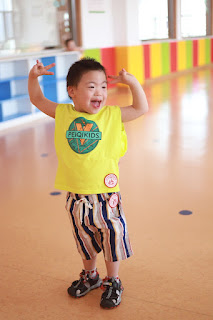Most of the children in our care have physical or intellectual impairments. Through our many years of working with them, we have come to realize how very important it is for adults to take initiatives and create opportunities for rich experiences for them, to organize play and to model social and cultural activities. At the same time we must also maintain a sense of stability and security.
For a child with special needs, life can be full of challenges. As caring and supportive adults, one of the most powerful things we can do is to take the lead in creating enriching experiences that foster their growth, learning, and wellbeing.
We do our best to provide a learning environment, both indoor and outdoors, where the children in our care have access to spontaneous interactions and learning moments. By organizing a vegetable garden, for example, we are opening up a world of new sights, sounds, scents and textures. The children get to help in the garden, feel the fresh vines of cucumbers, hear the rustle of corn leaves, and see vibrant colors in tomatoes. And when it's time to harvest we get to smell and taste the fruit of our labor! It also creates abundant opportunities to learn concepts like “organic fertilizer”. These moments are not just enjoyable. They are crucial for their sensory, cognitive, and emotional development.
Play is another main area where adults can make a significant impact. For the children in our care, play does not necessarily come easily or naturally. They often need help to understand how to engage with toys or how to interact playfully with peers.
This is when adults come in for support. We teach the children play skills and communication skills by modelling, for example, building a tower with blocks, pretending to feed a doll with food made of Play-Doh. We also initiate ball-passing games with children to teach collaboration and turn taking.
Yet another key dimension that adults need to consciously lead is modeling social and cultural activities. Clear and consistent modeling can be incredibly helpful for the children we work with. Many children with intellectual impairment tend to struggle with reading social cues and social norms. By modeling simple social exchanges like greeting others, and knocking on the door before entering, adults pave the way for social development in the children.
All of the above, of course, must be grounded in stability and security, which we provide by maintaining a routine, offering consistent support, and creating a nurturing environment as part of our job. This stability is not only useful for fostering a sense of safety, but it also helps build trust and confidence needed for the children to explore and engage with the world around them.
At the heart of it all, taking initiative as adults means being intentional in how we support the children. It’s about meeting them where they are, and helping them reach their full potential. Every experience, every play session, and every moment of connection counts. By doing this, we’re showing them that they are loved, valued, and capable.














